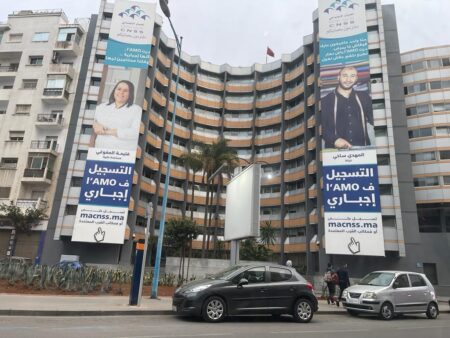The first blow fell yesterday when the Wilaya of Casablanca informed us, via an extremely brief communiqué, that Uber’s activity in Morocco was illegal. Beyond the primary self-satisfaction on the theme of “we told you so”, we were waiting for Uber’s response.
It was not long before the company issued a rather strange press release.
Uber’s activities are illegal in Morocco
Unlike in France, where UberX’s activity was legal and even gave rise to a specific law (imposing the 15-minute time limit on VTCs), when Uber arrived in Morocco, the activity it offered was illegal. To find out why in detail, you can reread the long post we wrote on the subject, which is summarised below.
The passenger transport business is strictly regulated in Morocco.
With the exception of special cases (school transport, company transport, ambulances), it is reserved exclusively for four parties as far as cars are concerned (i.e. not buses):
- small taxis, within cities
- large taxis, outside city limits (e.g. airport transfers in Casablanca)
- Grande Remise (TGR) vehicles, which are prohibited from having an odometer (and therefore cannot charge according to the Uber model) and are luxury cars (like limousines)
- tourist transport vehicles, whose direct use by Moroccans is strictly reserved for voluntary activities (associations) and subject to formal conditions that are impossible for Uber to meet (prior transfer to the Wilaya or the Transport Department of a list of passengers signed by the principal); apart from this, they are only authorised to receive orders from travel agencies. Finally, tourist transport operators are not allowed to do anything other than transport tourists.
The paradox is that this very strict organisation was put in place a long time ago, not at all with the aim of countering Uber, but to organise a sector by avoiding, above all, black-marketeers and the spillover of activities from one sector into another. In the same way, tourist transporters, like hotels, are theoretically prohibited from organising tours, which are reserved for travel agencies.
Being in a system framed by law where “everything that is not authorised is forbidden”, it is difficult to make room for Uber.
Uber says “ah but we only do platforms”.
We are a technology company that provides an information service via its mobile application to transport companies with a tourist transport licence.
We respect local legislation and our technology is open to any type of vehicle with a transport licence.
Uber acts as an intermediary. Basically, Uber is just a tool, anyone can use it and Uber only acts as an intermediary.
That’s not wrong, but… the Wilaya’s press release clearly stated that the “vehicles did not have authorisation“.
All drivers employed by tourist transport companies hold an authorisation card for each vehicle provided by the Ministry of Equipment and Transport.
Uber is playing deaf and doesn’t want to hear that tourist transport vehicles are not authorised to provide any kind of transport. It’s normal, it’s their business.
They also undergo interviews with the Uber team before being allowed to join the platform.
This statement is double-edged, as we shall see :)
Several transport-related laws were drafted before smartphones and applications existed, and we want to work with regulators to adapt regulations to the new technologies.
That’s a load of rubbish.
Firstly, because the legislation on tourist carriers has recently been updated, and mentions the possibility of transmitting the transport manifest by e-mail.
Secondly, because the issue is not the intermediation tool, but the substance, the type of service provided.
Uber is trying to put the debate on a strictly technological footing when that is not the issue at all.
As a platform, is Uber really completely legal?

The fact that Uber is a technology platform does not absolve it of all responsibility.
It “knowingly” organises an illegal activity for the drivers, and makes a profit from it (the commissions).
This may be regarded as complicity and trafficking of stolen goods.
With regard to tourist carriers, it is both the principal, the company that collects and invoices the end customer, and the company that pays the tourist carrier. It selects his service providers after an interview, from which point it can no longer act as a neutral intermediary.
If we refer to Moroccan legislation, in the context of tourist transport, the only possible types of customer are :
- hotels and similar establishments
- Moroccan voluntary organisations (associations, etc)
- travel agencies
Uber is neither a hotel nor a voluntary organisation.
It therefore plays the role of a travel agency, without having a licence. This is a serious offence under criminal law, and the personal liability of its directors may be called into question.
But it is also, in the current situation, one of the only two ways out for Uber that is really legal: to become a travel agency.
But this is very dangerous, and strategically impossible, because it would call into question its status in a great many countries.
The other would be to change its business model completely, to become a taxi booking centre, like Itaxi.ma… and have to justify the huge price differential with the competition.
The third is to do enough lobbying to get the law radically changed. We don’t believe it, but maybe we’re wrong.
 A typo or syntax error? You can select the text and hit Ctrl+Enter to send us a message. Thank you! If this post interested you, maybe you can also leave a comment. We'd love to exchange with you !
A typo or syntax error? You can select the text and hit Ctrl+Enter to send us a message. Thank you! If this post interested you, maybe you can also leave a comment. We'd love to exchange with you !




